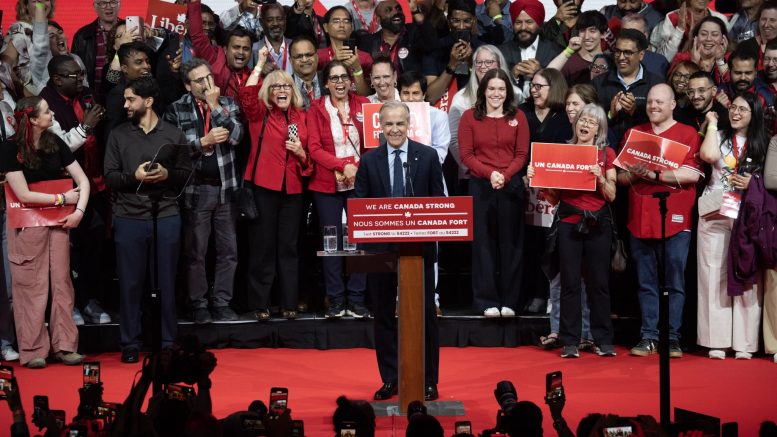Mark Carney has secured a fourth term for the Liberals following victory in Canada’s 45th general election on Monday — concluding a campaign period that lasted just over a month.
According to preliminary results from Elections Canada as of 11:45 a.m. CDT, the Liberals are leading in 169 ridings compared to 144 ridings for the Conservatives, with 99.9 per cent of polls reporting.
CTV News has previously projected that the Liberals will form a minority government, just shy of the 172-seat threshold needed for a majority government. Five ridings have been added since the 2021 general election, per a mandatory review of electoral districts every decade.
The Bloc Québécois, NDP and Green Party all lost seats, with the NDP projected to secure 7 seats — down 17 seats from before the election — and out of official party status which requires at least 12 seats in the House of Commons.
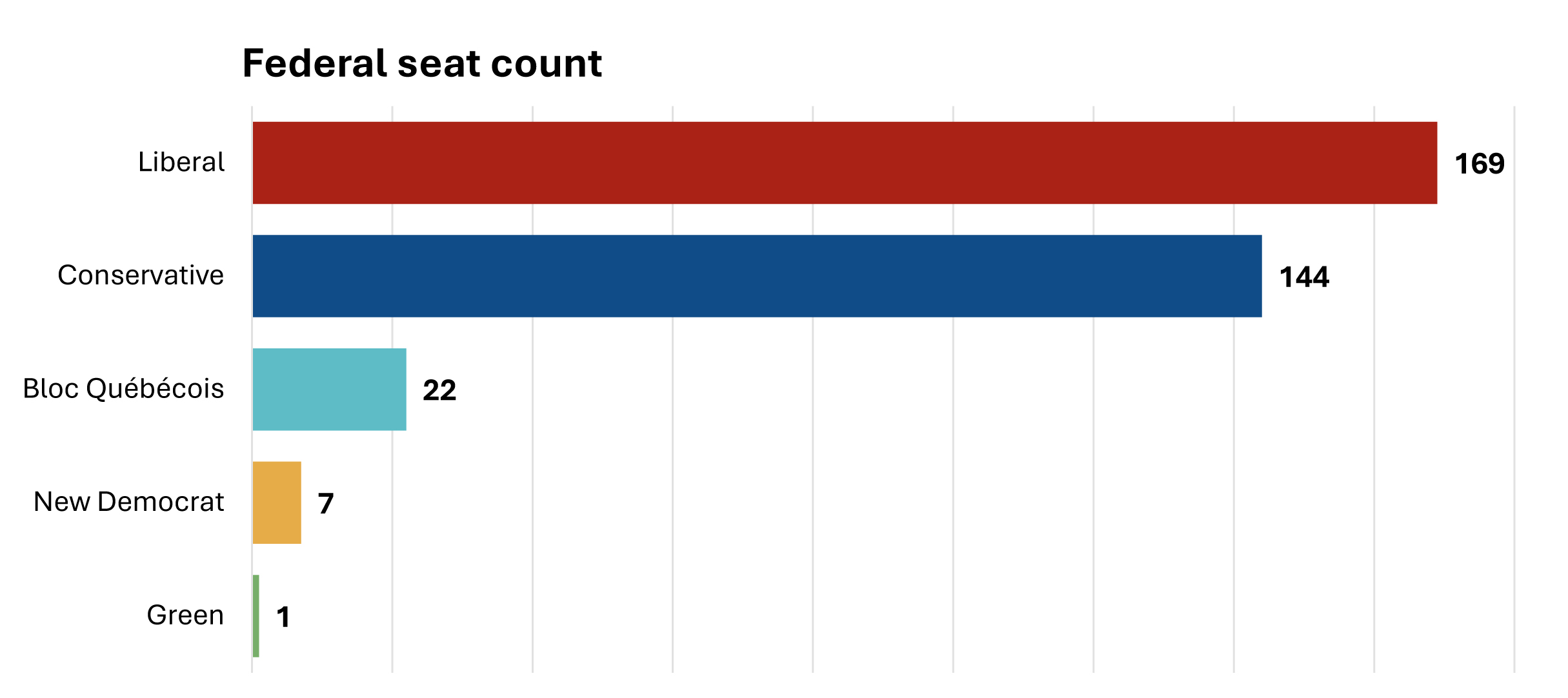
Seat count in the House of Commons following Canada’s 45th general election. Preliminary data from Elections Canada with 99.9 per cent of polls reporting as of May 1 at 12 p.m. CDT. Graph by Milan Lukes
“My government will work for all of you,” Carney announced during his election victory speech.
“We will protect our workers and businesses, and above all, we will build an independent future for our great country. A future that makes the greatest country on earth even better.”
Carney reiterated that Canada is a sovereign nation and stated that “President Trump is trying to break us so that America can own us. That will never ever happen.”
Trump has previously called for Canada to become the 51st state and has referenced former Prime Minister Justin Trudeau at times as “governor” during his time in office.
“I think Canada would be much better off being a 51st state,” Trump told Fox News in an interview that aired in February. Trump stated on social media on election day that Canada would face increased military powers, reduced taxes and zero tariffs if the nation became part of the United States.
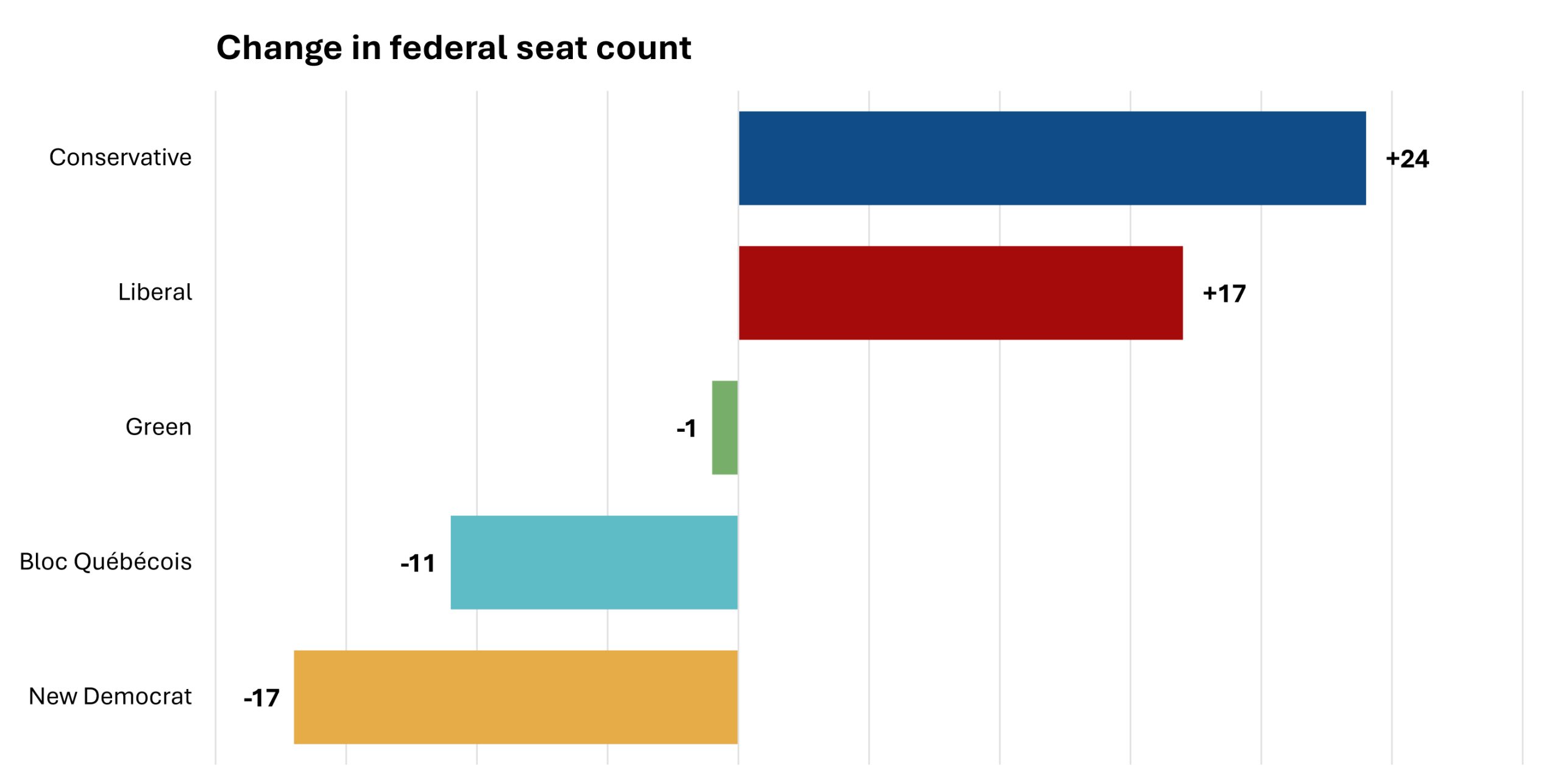
Seat count change in the House of Commons following Canada’s 45th general election. Data from the House of Commons. Graph by Milan Lukes
Poilievre loses his Carleton seat
Carney, who was elected to his first seat in the House of Commons, stated during his victory speech that he also looks forward to working with Bruce Fanjoy — the Liberal candidate who defeated Conservative Party leader Pierre Poilievre in his own riding.
Poilievre has represented his Ottawa-area riding of Carleton since first being elected in 2004, previously winning the riding during the last general election by over 15 per cent. Fanjoy edged out Poilievre by 5 per cent of the votes, according to preliminary results from Elections Canada.
Though the Conservatives failed to capture the most seats, preliminary data indicates that they gained 24 seats — more than the 17 seats picked up by the Liberals.
As of 11:45 a.m. CDT, the Liberals garnered 43.7 per cent of the popular vote compared to 41.3 per cent by the Conservatives, according to Elections Canada. The election denotes the first time since 1930 that two parties have received more than 40 per cent of the vote.
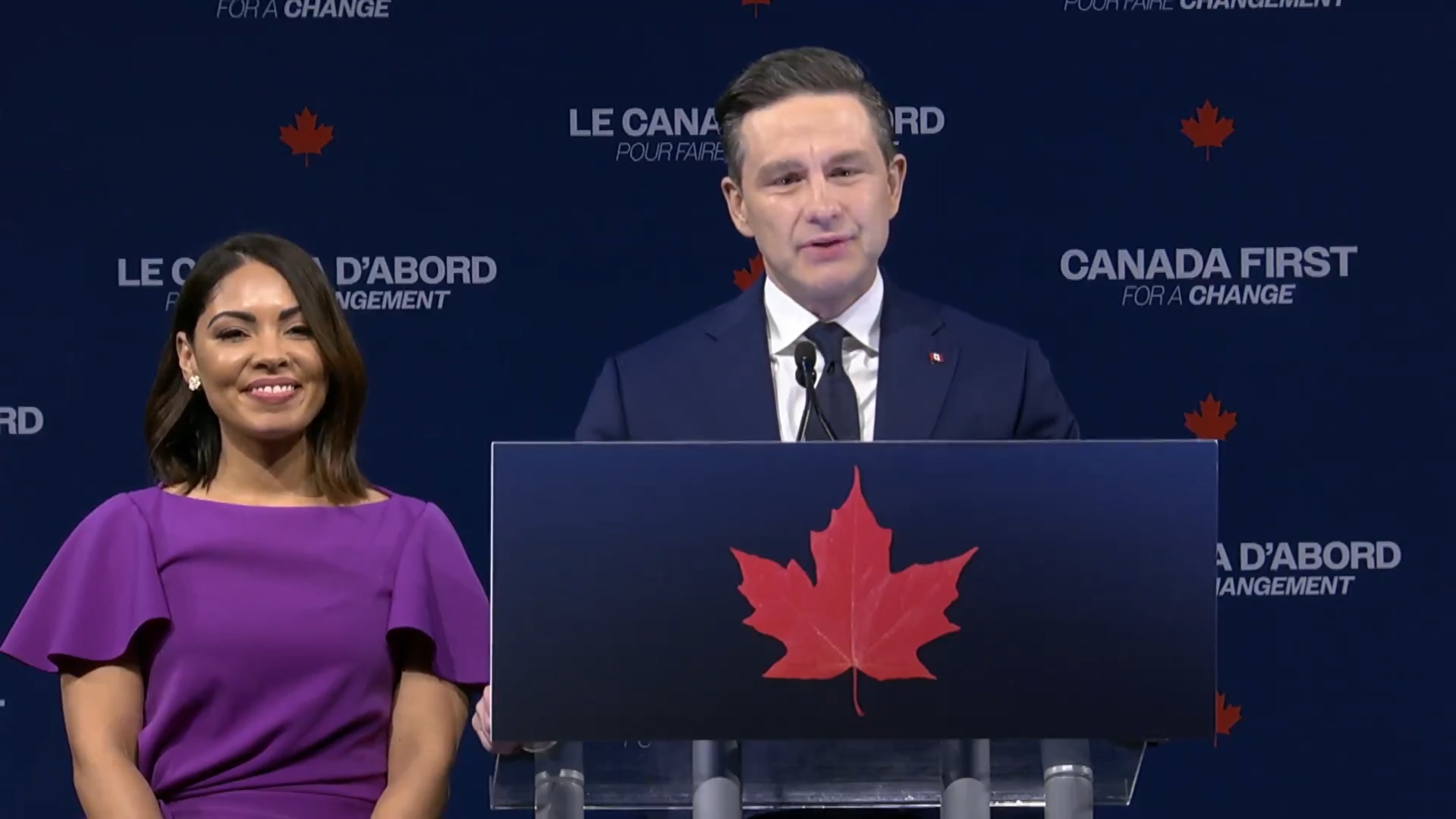
Conservative leader Pierre Poilievre stood next to his wife Anaida Poilievre during his concession speech early on April 29, 2025. Screenshot from x.com/PierrePoilievre
“We are cognizant of the fact that we didn’t quite get over the finish line yet,” said Poilievre during his concession speech, who vied against 90 contenders on the ballot for his seat.
“We know that change is needed, but change is hard to come by. It takes time. It takes work. And that’s why we have to learn the lessons of tonight so that we can have an even better result the next time the Canadians decide the future for the country.”
Under law, the leader of the Official Opposition must be held a sitting MP, though that is not a requirement to serve as leader of the Conservative Party.
“I will never give up on fighting for everyone who stood with us today and the millions of people who voted for other parties,” he said.
Singh steps down as leader after losing his own seat
Jagmeet Singh, leader of the NDP, was also unable to win his seat — running for re-election in Burnaby Central in B.C. and coming in third place to Liberal candidate Wade Chang.
“I’ll be stepping down as party leader as soon as an interim leader can be appointed,” he announced during his concession speech. Singh was elected as leader on the first-round ballot in 2017.
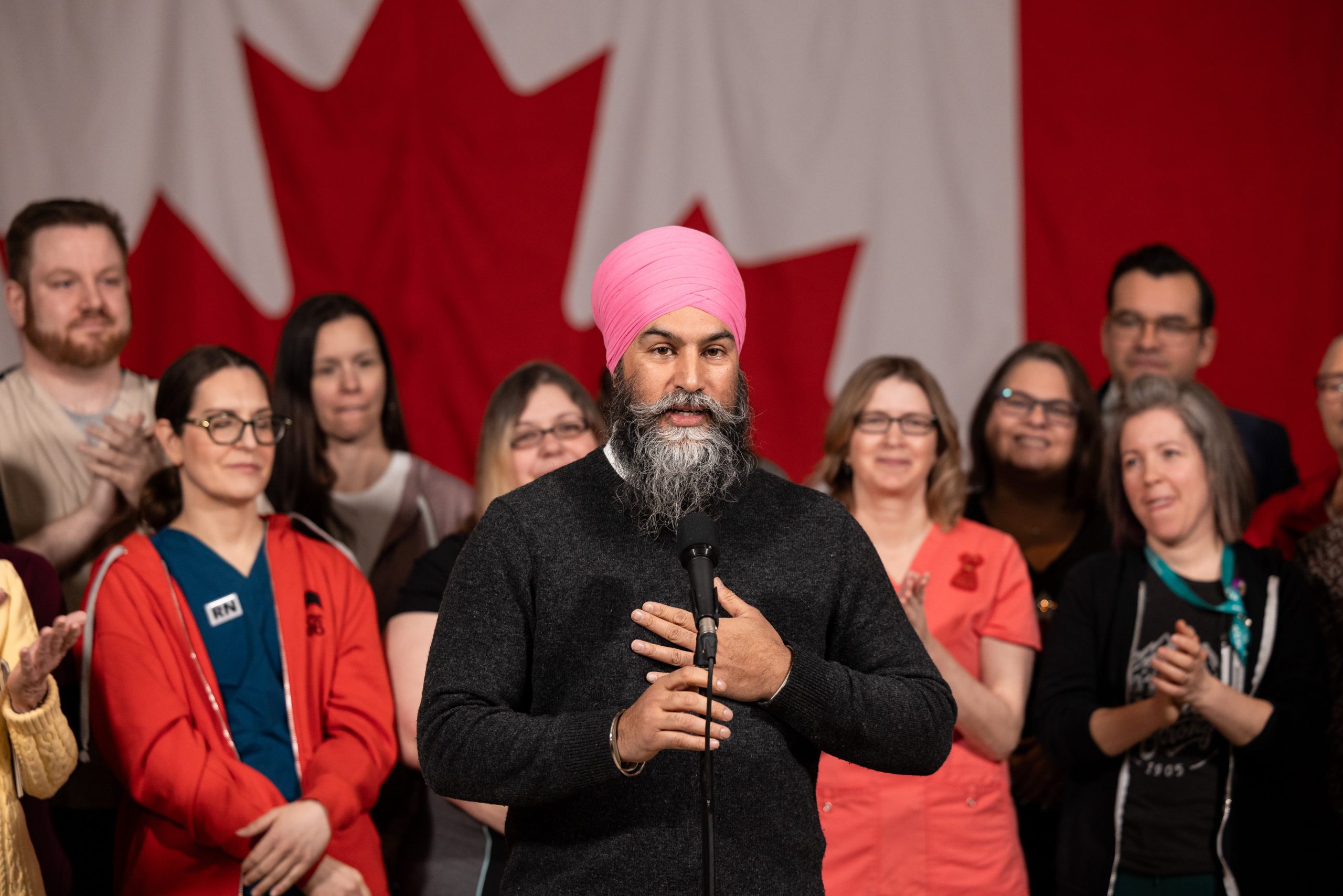
NDP leader Jagmeet Singh announced that he will resign as party leader. Singh finished third in his own riding with the NDP losing official party status. Photo from x.com/theJagmeetSingh posted on April 26, 2025
“I know this night is a disappointing night for New Democrats. We had really good candidates that lost tonight,” he stated.
Since being founded in 1961, the last time the NDP lost official party status in the House of Commons was after the 1993 election under Audrey McLaughlin, where the party only secured 9 seats and 6.9 per cent of the vote.
Without official party status, the NDP would receive less in parliamentary budget funding, lose the ability to sit on committees and have fewer opportunities to speak during question period.
The NDP previously formed the Official Opposition from 2011 to 2015 under Jack Layton, winning an all-time high 103 ridings.
Liberals gain two seats in Manitoba, Conservatives gain one
Three ridings in Manitoba have flipped from the previous election, with the Liberals gaining two seats and the Conservatives gaining one.
Liberal candidate Doug Eyolfson unseated incumbent Conservative Marty Morantz in Winnipeg West, previously known as Charleswood—St. James—Assiniboia—Headingley before the riding redistribution.
Eyolfson, who previously served as an MP for the riding from 2015-19, defeated Morantz with nearly 14 per cent more votes. Eyolfson tried to regain his seat in the past two general elections, losing to Morantz by 1 per cent in 2021.
NDP incumbent Niki Ashton was also defeated in Churchill—Keewatinook Aski, a riding that she has represented since 2008, losing to Liberal candidate Rebecca Chartrand.
The NDP lost a second seat in Manitoba following the defeat of Leila Dance in Elmwood—Transcona to Conservative candidate Colin Reynolds. Dance previously defeated Reynolds in a September 2024 by-election after the resignation of Daniel Blaikie, who held the riding for the NDP since 2015.
Overall, the Conservative seat count in Manitoba remains unchanged at 7 seats, with the gain of Elmwood-Transcona by Reynolds making up for the loss in Winnipeg West.
The Liberals now maintain 6 seats — an increase of 2 seats from the previous election — with the NDP down to a lone seat in the province. NDP incumbent Leah Gazan was re-elected in Winnipeg Centre, defeating the Liberal runner-up by over 4 percentage points.
National voter turnout amounted to 68.7 per cent of registered electors, according to Elections Canada, which does not include electors who registered on election day. The last time voter turnout surpassed that number was in 1993, per historical data from Elections Canada.

